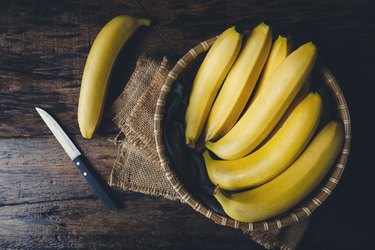
Even though ulcers aren't caused by eating certain foods, when you're suffering through the healing process, what you eat can make a difference in how you feel. You want to eat healthy, but could good-for-you fruits be bad for your ulcer?
According to Harvard Health Publishing, 4 million people in the U.S. develop an ulcer each year. Ulcers are open sores in the lining of the stomach or the duodenum (first part of the small intestine), but they can also be found in the esophagus, reports the American Academy of Family Physicians.
Video of the Day
Video of the Day
Stomach and duodenal ulcers typically occur when you're infected by H. pylori, a bacteria that settles in the stomach's lining, causing inflammation and swelling as well as gastritis and stomach cancer, according to the U.S. National Library of Medicine. Once that damage occurs, stomach acid can penetrate the sensitive lining of the stomach, says the National Institute of Diabetes and Digestive and Kidney Diseases (NIDDK).
Smoking, taking too much aspirin or ibuprofen or consuming too much alcohol or coffee, caffeinated or decaffeinated, can also irritate these areas of your gastrointestinal tract, reports Harvard Health Publishing.
Fruits for Ulcers
In a study published in the Brazilian Archives of Digestive Surgery in December 2014, researchers found that people with ulcers can enjoy fruits that are easy to digest, including apples, papaya, a variety of melons and bananas. Importantly, they add that oranges, pineapple, acerola and passion fruit should be eaten with caution, while lemons should be avoided.
Yet they also note that vitamin C, prevalent in oranges and other citrus fruits, along with vitamin A and the minerals zinc and selenium, are helpful as you recover. So working with a nutritionist may be helpful.
In fact, according to Alicia Romano, RD, LDN, a registered dietitian/nutritionist at the Frances Stern Nutrition Center of Tufts Medical Center in Boston, dietary therapy for people with ulcers and associated conditions needs to be individualized.
Fruits that trigger problems in someone else might have no ill effect on you. Nevertheless, before jumping into a diet change, she says, the first step should be to control major lifestyle factors that have a large role in ulcers — things like easing stress, quitting tobacco and reducing alcohol and caffeine consumption.
The next step, Romano says, is eating a high-fiber diet. "There's an abundance of research that shows high-fiber diets can be beneficial for patients with ulcers," she says. Not only should fruits and vegetables be increased, but so should total soluble fiber from whole grains, legumes and beans. "These nutrient rich foods have a lot of phytonutrients and antioxidants and anti-inflammatory benefit that works together to create the healthiest gut and healthy environment in the body," Romano adds.
More About Ulcers
If you've been grappling with the pain of an ulcer, but haven't seen your doctor yet, it's important that you do. The Mayo Clinic states that complications can develop if an ulcer isn't treated. Anemia can result from blood loss — signs include black or bloody stools and blood or brown grains in vomit if there's severe bleeding.
Not sure your discomfort is from an ulcer? Harvard Health Publishing notes that symptoms include a burning sensation two to three hours after eating and pain in the upper portion of the abdominal cavity. If you have a duodenal ulcer, you might also experience discomfort in your back. Other symptoms might include:
- Belching
- Bloating
- Nausea and/or vomiting
- No appetite
To diagnose your condition, your doctor will take down your medical history and ask a series of questions relating to your symptoms, current prescriptions and over-the-counter medications you take. He or she will physically examine you to check if your belly is bloated and painful.
If H. pylori is a prime suspect, you will likely be referred to a gastroenterologist to run tests and confirm the diagnosis, according to the National Institute of Diabetes and Digestive and Kidney Diseases. Test results will guide your treatment and allow the healing to begin.
Read more: Foods to Avoid When You Have a Stomach Ulcer
- Harvard Health Publishing: "Peptic Ulcers"
- American Academy of Family Physicians: "What Is an Ulcer?"
- U.S. National Library of Medicine: "Helicobacter Pylori Infections"
- National Institute of Diabetes and Digestive and Kidney Diseases: "Diagnosis of Peptic Ulcers"
- Brazilian Archives of Digestive Surgery: "Nutritional Care in Peptic Ulcers"
- Alicia Romano, RD, LDN, registered dietitian/nutritionist, Frances Stern Nutrition Center, Tufts Medical Center, Boston
- Mayo Clinic: "Peptic Ulcer"
- National Institute of Diabetes and Digestive and Kidney Diseases: "Symptoms and Causes of Peptic Ulcers"
Is this an emergency? If you are experiencing serious medical symptoms, please see the National Library of Medicine’s list of signs you need emergency medical attention or call 911.